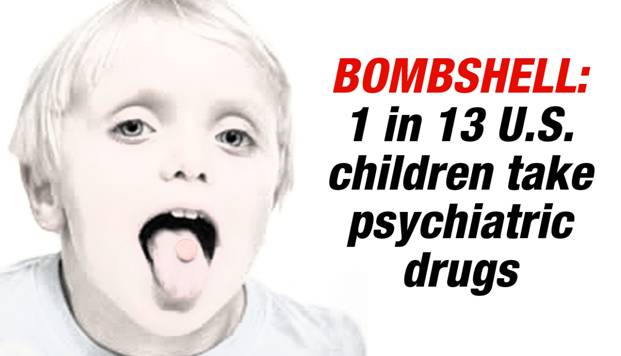
No matter how hard parenting is, giving your child psychiatric drugs must be considered very seriously, because it is very often a bad idea. Here is why.
Working with parents and kids for 30 years, I can tell you that it is not easy to be a parent. It is not easy because unlike computers or other gadgets, kids do not come with an instruction manual and they do not behave in a way that is easy to predict.
Inexperienced parents react to things that do not work as they expect. Experienced parents, having raised other kids through the same situation, can see the patterns and not panic when something unexpected happens.
I realized this when I had an early childhood center. After working in a group of 30 toddlers, I became an experienced parent in a flash. Why? Because when you deal with 30 kids, you can see that when your child does not behave the way you expect, he/ she is still normal. When you see your toddler touching his/ her sex organs, you may think something is wrong with him/her, but when you see 30 toddlers doing it, and you see them stop when you do not pay attention to it, you feel a bit more relaxed about your own toddler and comfort yourself that he/she is normal.
Inexperienced parents have a problem with the concept of normality. Since they have nothing to compare to, they do not know what is normal and what is not and too often jump to the conclusion that something is wrong with their child and needs to be fixed. This fear and doubt mindset about children’s development, behavior and achievement can cause many problems, mainly because it determines the parents’ course of action.
The “fix by pill” society trap
A common strategy for parents is to decide that every problem with the child comes from a brain issue over which the parents have no control. It is easy for parents to think that what seems to be their child’s problem has nothing to do with their own parenting style or circumstances and can be fixed by medication.
Generally, our society is “fix by pill”. We want pills to fix our health, weight, cognitive capacity (memory, concentration, comprehension) and emotional state (anti-depressants and other drugs), and we dream of a pill that will fix our financial situation. We even pass this mentality onto our children when we take them to doctors to get medication for every little thing that doesn’t seem to be working well.
It is easier to give children Ritalin than spend time with them. It is easier to give kids anti-depressants than work on our own relationships. It is easier to give our kids psychiatric drugs than to teach them how to manage their feelings, mainly because most of us don’t know to manage our own.

As a special education professional, I have met many kids who did not fit into the criteria for “normality” as the pharmaceutical companies would like them to. So every child who is a bit active gets Ritalin like it was chewing gum. When I studied special education, one of my professors was a psychiatrist and objected strongly to this drug, which he called “chewing gum”, because it was so accessible and easy to get. She told us that when kids misbehaved in the past, their parents would smack them and in his opinion, smacking was far less dangerous than Ritalin.
Few parents not know that Ritalin comes from the family of the drug Cocaine. It makes you high, which helps with concentration for a short time, and then brings you to a low state, which helps in case of hyperactivity. The problem with it is that, usually within 3-4 days, the high gets shorter and shorter and the low gets shorter and shorter so calm turns into apathy. This results in an addiction to an ever-increased dosage, which ends up being just as bad after a short time.
If you bother to ask kids who take Ritalin, they will tell you they feel very empty inside and lose interest in things. In order to feel alive, they do extreme things just to feel something. Most of them do dangerous things in a serious attempt to get excited, because they feel nothing – they cut themselves, they hurt others and they even hurt themselves. After taking psychiatric drugs for a while, they cannot learn coping strategies anymore, because feelings are a compass that helps us learn many things about ourselves and they feel nothing.
When I teach children with any label coping strategies, I teach them to use their feelings as a guide. Do you remember the game we used to play as kids when we hide something and lead the search towards this item with “hot” and “cold”? If you are closer to the object, the temperature is hot, and when you are far from the object, it gets cold.
Learning to cope using feelings is the same. Good feelings are hot and tell us we are closer to what we want, and uncomfortable feelings are cold and let us know we are far away from what we want.
Let’s say that a kid I work with has social problems and I teach him a trick to get closer to other kids by bringing a ball to school and inviting someone to join him in a play. If I teach this to a regular kid, the first attempt will be successful and give that child the motivation and confidence to try again. The good feeling of success is a great magnet, so the child will keep doing it to feel good.
However, when I teach this trick to a child who is taking Ritalin, he will not get the joy of someone joining him in the game, because his feelings are flat. If someone joins me for a game, and it feels just like being by myself, why bother? If you talk to kids on Ritalin, they lack the sense of success and the joy of achieving, because their emotional machine is blocked.
From drugs to medication to vitamins
The psychiatric world is heavily supported and boosted by the pharmaceutical companies. Many drugs are known to cause other health problems and sabotage the natural mechanisms in our bodies. In many cases, the side effects of those drugs make them more damaging than helpful. The way they became so common is that drugs changed name to “medication”. In our mind, drugs are illegal, but medication helps us get better. Some parents even say to their kids “Take your vitamins” when giving their kids psychiatric drugs.
If you want to know the severity of the issue, before you consider giving your child any of those psychiatric drugs, please do yourself, your child and your family a favor and search for alternative ways to get what you want.
You can find read my many articles about ADD, ADHD and ODD to learn about the fraud of psychiatric medication. Alternatively, you can watch 160 psychiatrics, doctors and other professionals to learn about what your child is prescribed. Watch this video and share it with other parents. Do yourself a favor and watch all of it before considering taking or giving your children any psychiatric medication.
And if you haven’t seen enough, watch this:
https://www.youtube.com/watch?v=PcuhhJ1BaMk
Remember that learning practical, effective parenting strategies is WAY better, cheaper, healthier and more helpful than giving your kids psychiatrist drugs!
Happy parenting,
Ronit











